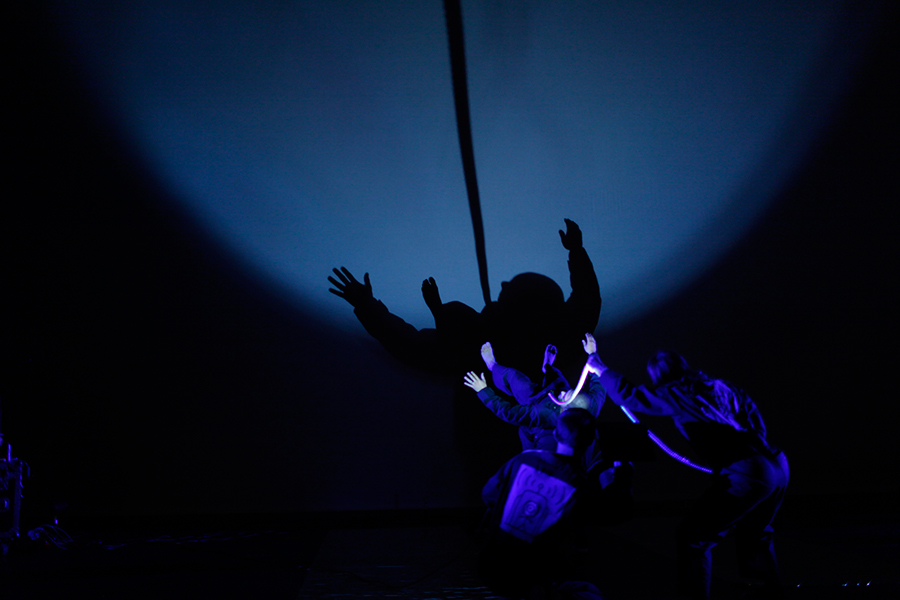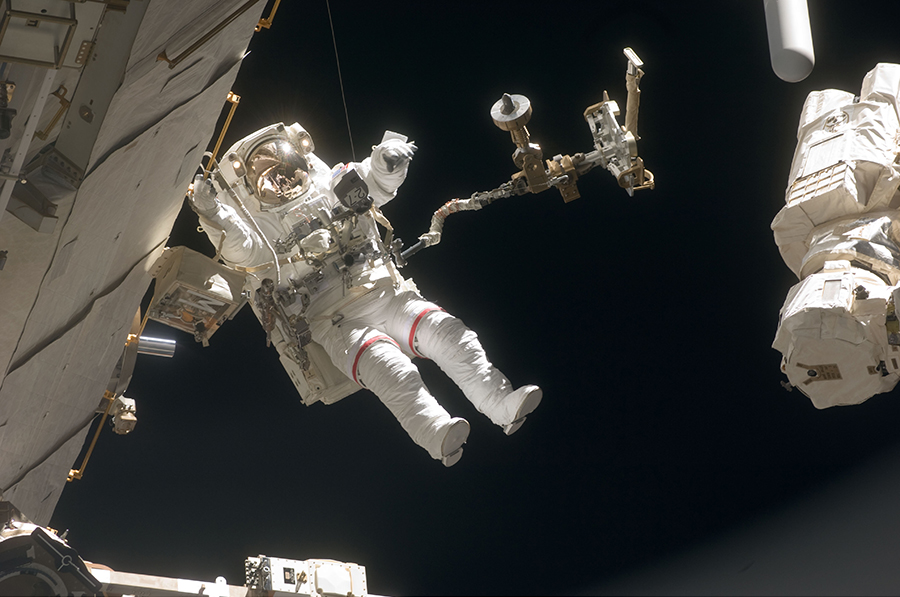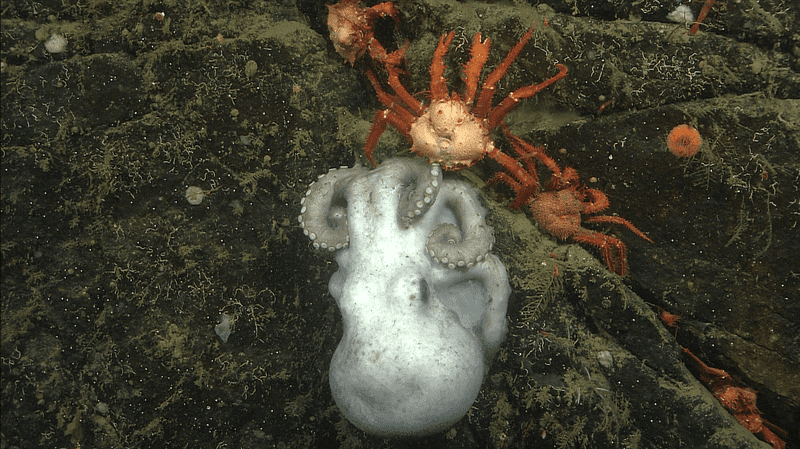Radiolab for Kids
Kid-friendly stories curated by Radiolab. All in one bingeable spot!
In 2007, Bruce Robison’s robot submarine stumbled across an octopus settling in to brood her eggs. It seemed like a small moment. But as he went back to visit her, month after month, what began as a simple act of motherhood became a heroic feat that has never been equaled by any known species on Earth.
This episode was reported and produced by Annie McEwen.
Special thanks to Kim Fulton-Bennett and Rob Sherlock at the Monterey Bay Aquarium Research Center. And thanks to the Indianapolis Chamber Orchestra for the use of their piece, “Concerto for Bassoon & Chamber Orchestra: II. Beautiful.”
Support Radiolab today at Radiolab.org/donate.
If you need more ocean in your life, check out the incredible Monterey Bay Aquarium live cams (especially the jellies!): www.montereybayaquarium.org/animals/live-cams
Here’s a pic of Octomom sitting on her eggs, Nov. 1, 2007.
We'll kick off the chase with Diana Deutsch, a professor specializing in the Psychology of Music, who could extract song out even the most monotonous of drones. (Think Ben Stein in Ferris Bueller. Bueller.)
For those of us who have trouble staying in tune when we sing, Deutsch has some exciting news. The problem might not be your ears, but your language. She tells us about tone languages, such as Mandarin and Vietnamese, which rely on pitch to convey the meaning of a word. Turns out speakers of tone languages are exponentially more inclined to have absolute (AKA 'perfect') pitch. And, nope, English isn't one of them.
What is perfect pitch anyway? And who cares? Deutsch, along with Jad and Robert, will duke it out over the merits of perfect pitch. A sign of genius, a nuisance, or an evolutionary superpower? You decide. (We can't).
Do you want to hear Dr. Deutsch's musical illusions? Check them out here!
We kick things off with one of the longest-running experiments in the world. As Joshua Foer explains, the Pitch Drop Experiment is so slow, you can watch it for hours (check out the live cam) and not detect the slightest movement. But that doesn't mean nothing's happening. Professor John Mainstone tells us about his desperate attempts to catch the flashes of action hiding inside this decades-long experiment.
Then, Carl Zimmer joins us for a little recalibration. It’s hard to imagine anything faster than a thought that just pops into your head. But that kind of thinking is actually wrong-headed. In reality, thoughts are achingly, even disturbingly slow. Seth Horowitz, author of The Universal Sense: How Hearing Shapes the Mind, helps us discover our fastest possible thought, and fight our way back into the now.
According to one theory, the moon formed when a Mars-sized chunk of rock collided with Earth. After the moon coalesced out of the debris from that impact, it was much closer to Earth than it is today. This idea is taken to it's fanciful limit in Italo Calvino's story "The Distance of the Moon" (from his collection Cosmicomics, translated by William Weaver). The story, narrated by a character with the impossible-to-pronounce name Qfwfq, tells of a strange crew who jump between Earth and moon, and sometimes hover in the nether reaches of gravity between the two.
This reading was part of a live event hosted by Radiolab and Selected Shorts, and it originally aired on WNYC’s and PRI’s SELECTED SHORTS, paired with a Ray Bradbury classic, “All Summer in a Day,” read by musical theater star Michael Cerveris. Hosted by BD Wong, you can listen to the full show here.
Back in 2012, when we were putting together our live show In the Dark, Jad and Robert called up Dave Wolf to ask him if he had any stories about darkness. And boy, did he. Dave told us two stories that became the finale of our show.

 Back in late 1997, Dave Wolf was on his first spacewalk, to perform work on the Mir (the photo to the right was taken during that mission, courtesy of NASA.). Dave wasn't alone -- with him was veteran Russian cosmonaut Anatoly Solovyev. (That's a picture of Dave giving Anatoly a hug on board the Mir, also courtesy of NASA).
Back in late 1997, Dave Wolf was on his first spacewalk, to perform work on the Mir (the photo to the right was taken during that mission, courtesy of NASA.). Dave wasn't alone -- with him was veteran Russian cosmonaut Anatoly Solovyev. (That's a picture of Dave giving Anatoly a hug on board the Mir, also courtesy of NASA).
Out in blackness of space, the contrast between light and dark is almost unimaginably extreme -- every 45 minutes, you plunge between absolute darkness on the night-side of Earth, and blazing light as the sun screams into view. Dave and Anatoly were tethered to the spacecraft, traveling 5 miles per second. That's 16 times faster than we travel on Earth's surface as it rotates -- so as they orbited, they experienced 16 nights and 16 days for every Earth day.
Dave's description of his first spacewalk was all we could've asked for, and more. But what happened next ... well, it's just one of those stories that you always hope an astronaut will tell. Dave and Anatoly were ready to call it a job and head back into the Mir when something went wrong with the airlock. They couldn't get it to re-pressurize. In other words, they were locked out. After hours of trying to fix the airlock, they were running out of the resources that kept them alive in their space suits and facing a grisly death. So, they unhooked their tethers, and tried one last desperate move.
In the end, they made it through, and Dave went on to perform dozens more spacewalks in the years to come, but he never again experienced anything like those harrowing minutes trying to improvise his way back into the Mir.
After that terrifying tale, Dave told us about another moment he and Anatoly shared, floating high above Earth, staring out into the universe ... a moment so beautiful, and peaceful, we decided to use the audience recreate it, as best we could, for the final act of our live show.
Pilobolus creates a shadow astronaut during Dave Wolf's story on stage (photo by Lars Topelmann):

The audience turns Portland's Keller auditorium into a view of outer space with thousands of LED lights (photo by Lars Topelmann):

Here's Dave Wolf in the dark darkness of space, performing a spacewalk in 2009 (courtesy of NASA):

To give you an idea of what it looks like during the brightness of day, here's another photo taken in 2009 -- more than a decade after the adventure described in our podcast -- this time of astronaut Tom Marshburn (Dave Wolf is with him, out of frame, photo courtesy of NASA):

This episode was produced by Matt Kielty and Soren Wheeler.
Support Radiolab today at Radiolab.org/donate.
This all started back when we were working on our Guts show, and author Frederick Kaufman told us about getting sucked in to the mystery of what happens to poop in New York City. Robert and producer Pat Walters decided to take Fred's advice and pay a visit to the North River Wastewater Treatment Plant... which turned out to be just the beginning of a surprisingly far-ranging quest.
Want some more sewer fun?
Read: As Robert and Pat report, some of that sewer sludge made it out into the ocean. Wonder what happened to it?
Play: Try out our Poop Quiz:
While most of us hear a wall of white noise, squeaks, and squawks....David Rothenberg hears a symphony. He's trained his ear to listen for the music of animals, and he's always looking for chances to join in, with everything from lonely birds to giant whales to swarming cicadas.
In this podcast, David explains his urge to connect and sing along, and helps break down the mysterious life cycle and mating rituals of the periodical cicadas into something we can all relate to.

David Rothenberg making music with the cicadas.Courtesy of David Rothenberg/Bug Music
A visual breakdown of the cicada mating calls:
Courtesy of John Cooley and David Marshall at UConn. For more on cicada mating calls, take a look at this paper from Cooley and Marshall.
A close-up of cicadas getting down:

Courtesy of David Rothenberg/Bug Music
Enjoy a free download of our favorite track from David's CD Bug Music -- here's the description from the liner notes:
Katydid Prehistory: Named in honor of Archaboilus musicus, the 165 million year old prehistoric katydid, whose fossil remains reveal an ability to sing distinct pitches.
In this short, writer Alex Bellos tells Robert how, from the very first time humans ever used numbers, we couldn’t help but give them human-like qualities. From favorite numbers to numbers that we’re suspicious of, from 501 jeans to Oxy 10, our feelings for these digits may all come down to some serious, subconscious inner-math….a deeply human arithmetic buried in our heart.
When the conservationists showed up at Clarice Gibbs’ door and asked her to take down her bird feeders down for the sake of an endangered bird, she said no. Everybody just figured she was a crazy bird lady. But writer Jon Mooallem went to see her and discovered there was much more to this story. Mrs. Gibbs tells us her surprising side of the tale, and together with Joe Duff, we struggle with the realization that keeping things wild in today's world will be harder than we ever would’ve thought.
On a quiet, warm summer day, somewhere in the soil beneath your feet, tucked into a nearby plant, or at the edges of a pond, a tiny little cataclysm is happening: an insect is transforming, undergoing metamorphosis. The chrysalis is easily nature’s best known black box, but it turns out, it’s one of the least understood, and most complicated: when producer Molly Webster peers inside a pupa, she witnesses some of the most complex biology happening on earth...and catches sight of an ancient question of change.
Special thanks to Lynn Riddiford, over at the Howard Hughes Medical Institute, and to Father James Martin, S.J., editor at large for America magazine.
We begin with Ann Druyan, widow of Carl Sagan, with a story about the Voyager expedition, true love, and a golden record that travels through space. And astrophysicist Neil de Grasse Tyson explains the Coepernican Principle, and just how insignificant we are.
What's with our need to get close to "wildness"? We examine where we stand in this paradox--starting with the Romans, and ending in the wilds of Belize, staring into the eyes of a wild jaguar.
When Ian Frazier was a kid, he (like most 6-year-olds) mastered the art of tic tac toe. Pretty soon, every match was a draw, and the game lost its magic.
Then one day, many years later, he met a 6-year-old named Igor who lived deep in Siberia. On a whim, Ian drew a tic tac toe board in his notebook and showed it to Igor...who had no idea what it was. Ian taught him how to play, then joyfully went about clobbering his new opponent.
Then, Ian started asking around...and it turned out none of the Russians he talked to had heard of tic tac toe. Could it be that huge swaths of the globe just didn't play? Jad and Robert wanted to find out just how widespread this seemingly universal game really is--so they rallied listeners from all over the world to help them do some legwork.
Ian Frazier's most recent book is Travels in Siberia.
With the help of paleontologist Neil Shubin, reporter Emily Graslie and the Field Museum's Paul Mayer we discover that our world is full of ancient coral calendars. Each one of these sea skeletons reveals that once upon a very-long-time-ago, years were shorter by over forty days. And astrophysicist Chis Impey helps us comprehend how the change is all to be blamed on a celestial slow dance with the moon.
Plus, Robert indulges his curiosity about stopping time and counteracting the spinning of the spheres by taking astrophysicist Neil deGrasse Tyson on a (theoretical) trip to Venus with a rooster and sprinter Usain Bolt.
Reporter Ari Daniel visits with Willie Wilson, who studies phytoplankton--aka microscopic plant-like creatures--at Bigelow Laboratory in Maine. There's a war in Willie's test tubes. A certain sort of phytoplankton known as coccolithophores are engaged in a surprisingly complicated arms race with deadly viruses. A virus is problematic enough when you're a human. Now imagine being a single-cell plant and mixing it up with the hugest virus you've ever seen. The coccos (as we've taken to calling them) are outgunned, but they won't go down with out a serious fight.
Ari and Willie explain how our itsy-bitsy heroes take arms against (literally) a sea of troubles--and how this battle, and others like it, make life on Earth possible.
When we started reporting a fantastic, surreal story about one very cold night, more than 70 years ago, in northern Russia, we had no idea we'd end up thinking about cosmology. Or dropping toy horses in test tubes of water. Or talking about bacteria. Or arguing, for a year. Walter Murch (aka, the Godfather of The Godfather), joined by a team of scientists, leads us on what felt like the magical mystery tour of super cool science.
Whatever your feelings on Disco, it's hard not to root for the resurgence of one particular track that started taking CPR classes by storm. Producer Ellen Horne explains how one aptly named 70s mega-hit could help you save someone's life.
Then, Jad and Robert pit physics against an ancient tale. In the bible, the sound of seven shofar players (shofars are basically trumpets made of rams' horns) blasts down the walls of Jericho. To find out how many shofars it would actually take to level a Bronze Age wall, we call on engineer and sound expert David Lubman. And we pay a visit to Cantor Daniel Pincus to hear him and his students blow some powerful shofars. Finally, we talk to inventor Woody Norris about a modern twist on this biblical challenge.
Many thanks to the 2010 Shofar All-Stars who played for us: David Liebowitz, Daniela Drakhler, Miriam Frank, Adam Hametz-Berner, Rachel Kelk, Ed Kerson, Anna Levy, Richard Scheiner, and Robert Wine.
Could parasites be the shadowy hands that pull the strings of life? We explore nature's moochers, with tales of lethargic farmers, zombie cockroaches, and even mind-controlled humans (kinda, maybe). And we examine claims that some parasites may actually be good for you.
Psychologist Walter Mischel explains how one little test involving a marshmallow might tell you a frightening amount about what kind of person you are. And Radiolab favorite Jonah Lehrer helps us make sense of the results. This one's all about our will power (or lack thereof).
Correction: An earlier version of this piece incorrectly stated that the kids who performed better on the marshmallow test had higher GPAs in high school and went to better colleges. Those elements were not a part of Mischel’s original study. The audio has been adjusted to reflect this fact.
Math can get pretty loopy, at least when we try to explain it. But according to author Alex Bellos, the most straightforward mathematical concept might be the loopiest. Then producer Mark Philips introduces us to William Basinski, a composer who loops analog tape to create a unique sort of music. One day, Basinski dug up some of his old tapes, stuck them into his player, and heard a melody in the throes of death.
Life and death are a very long loop of their own, as producer Lynn Levy discovered in talking with oceanographer Craig Smith. His career began with a simple question: what happens to a whale when it dies and sinks to the sea floor? Turns out nobody was quite sure. Craig describes the curious interplay between death and life at the bottom of the ocean.
For most of human history, flight was an impossible dream. In this short, the dizzying rise and fall of a pilot whose aeronautic feats changed aviation forever and turned chancy stunts into acrobatic mastery.
Lincoln Beachey is one of the most famous men you’ve never heard of. Born in 1887 in San Francisco, Beachy was lonely, chubby kid who, as authors Sam Kean and Frank Marrero tell us, nobody would have suspected of becoming a hero. But he was fearless. By the age of 10 he was hurling himself down San Francisco’s stomach-churning Fillmore Hill on a bicycle with no brakes.
But what Beachy really wanted to do was fly airplanes. Then one day, while working as a mechanic at an airshow in Los Angeles, he got his big break: a star pilot got hurt, and Beachey leaped in to take his place. He shot upwards, 3,000 feet into the air…and his motor failed. He went into a nose-diving spin that no pilot had ever survived. And he did what no pilot had ever done: he turned into the spin, regained control, and landed safe and sound.
After that, Beachey became a superstar. At a time when the entire population of the US was 90 million people, 17 million came out to see him fly in just one year. He invented figure 8s and the vertical drop, and was the first pilot to achieve terminal velocity by flying straight toward the ground. In fact, what Beachey did was so extraordinary, and so dangerous, that a wave of pilots died trying to imitate him. After the death of a dear friend of his, Beachey finally vowed to retire. And he did. For three months. Until he finally buckled…and strapped himself back in a cockpit to master the trick of all tricks: the loop the loop. Lincoln perfected it—looping so effortlessly he seemed to own the sky. Until his final flight in 1915, where he stunned the crowds—a quarter of a million fans at the World’s Fair in San Francisco—one last time.
Related reads:
Sam Kean's The Disappearing Spoon
Frank Marrero's Lincoln Beachey: The Man Who Owned the Sky
Thanks to the talented jump-ropers at CS 200 in Harlem, and singers at LaGuardia School of the Arts!
They buzz. They bite. And they have killed more people than cancer, war, or heart disease. Here’s the question: If you could wipe mosquitoes off the face of the planet, would you?
Ever since there have been humans, mosquitoes have been biting us, and we’ve been trying to kill them. And, for the most part, the mosquitoes have been winning. Today there are over 3000 species on pretty much every corner of Earth. Mosquito-borne diseases kill around 1 million people a year (most of them children) and make more than 500 million people sick. But thanks to Hadyn Perry and his team of scientists, that might be about to change. Producer Andy Mills talks with author Sonia Shah about the difficulties of sharing a planet with mosquitoes and with science writer David Quammen about the risks of getting rid of them.
Aristotle thought that laughter is what separates us from the beasts, and that a baby does not have a SOUL, until the moment it laughs for the first time. Historian Barry Sanders, author of Sudden Glory, says that according to Aristotle, this moment of "human ensouling" is supposed to happen when a baby is 40 days old. We follow radio producer Amanda Aronczyk as she tests this theory on her newborn baby.
Then we go to Bowling Green State University in Ohio, to tickle rats with psychobiologist Dr. Jaak Panksepp. It's his notion that laughter is found all across the animal kindgom. Boom, Aristotle! Then Dr. Robert Provine, author of Laughter: A Scientific Investigation, shows us chimps who seem to be laughing. Boom Boom!
We also get the giggles with a bit of archival tape from comedians Elaine May and Mike Nichols. And Tyler Stillman, a psychologist at Florida State University, eloquently delineates the awesomeness of laughter.
Not long ago, writer Mary Roach got a real hands-on lesson on the gut: she got to stick her hand inside a real live cow stomach, and experience digestion from the inside. When we heard about her adventure, we had to try it ourselves—so producer Tim Howard headed to Rutgers University to see, feel...and smell...a fistulated cow firsthand.
It's the end of the 19th century -- the Civil War is over, and the frontier is dead. And young college men are anxious. What great struggle will test their character? Then along comes a new craze: football. A brutally violent game where young men can show a stadium full of fans just what they're made of. Harvard, Yale, Princeton, Penn -- the sons of the most powerful men in the country are literally knocking themselves out to win these gladiatorial battles. And then the most American team of all, with the most to prove, gets in the game and owns it. The Carlisle Indian School, formed in 1879 to assimilate the children and grandchildren of the men who fought the final Plains Wars against the fathers and grandfathers of the Ivy Leaguers, starts challenging the best teams in the country. On the football field, Carlisle had a chance for a fair fight with high stakes -- a chance to earn respect, a chance to be winners, and a chance to go forward in a changing world that was destroying theirs.
To what extent is color a physical thing in the physical world, and to what extent is it created in our minds? We start with Sir Isaac Newton, who was so eager to solve this very mystery, he stuck a knife in his eye to pinpoint the answer. Then, we meet a sea creature that sees a rainbow way beyond anything humans can experience, and we track down a woman who we're pretty sure can see thousands (maybe even millions) more colors than the rest of us. And we end with an age-old question, that, it turns out, never even occurred to most humans until very recently: why is the sky blue?



